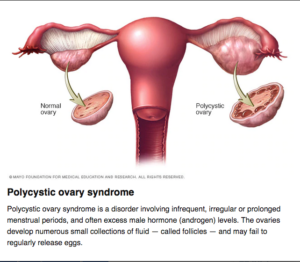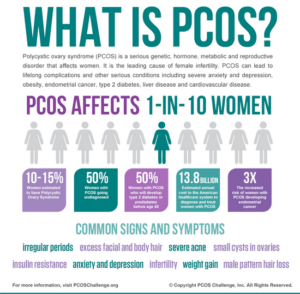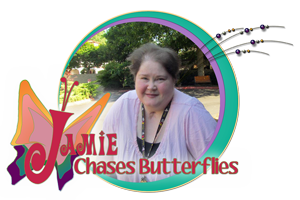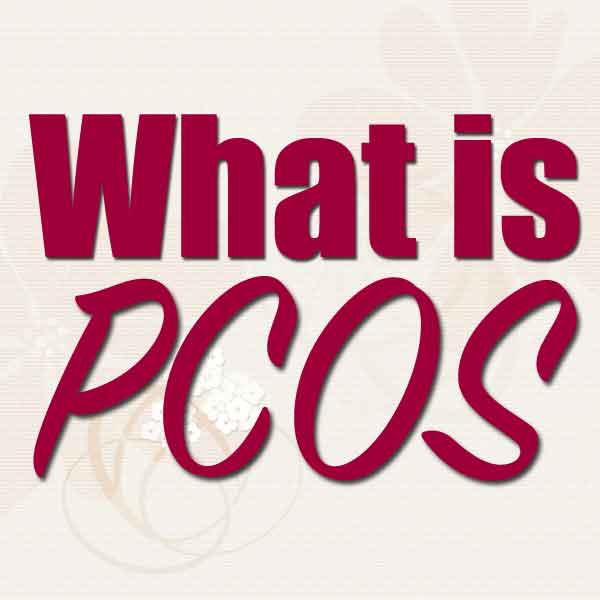September is Polycystic Ovarian Syndrome (PCOS) Awareness Month. PCOS is a group of symptoms that affect the ovaries and ovulation. In one study, up to 70 percent of women with PCOS hadn’t been diagnosed so it may be more common than we think.
I was diagnosed with PCOS when I was 12 years old. I started my period when I was 11, so I had issues from the beginning. It sucked. I rebelled against it. It caused me a lot of physical problems because I chose to rebel and did not start making lifestyle changes when I was younger. Lifestyle changes are one of the key things that help those who have PCOS to live well. When I say lifestyle changes I mean eating well and moving your body.
PCOS is a hormonal disorder that is common among women during the reproductive age. The reproductive age starts at 15 until the woman hits menopause. Five to ten percent of women have PCOS. It affects all races and ethnicities. It affects people all of shapes and sizes. With PCOS you make too much of the male hormones Androgenes. Androgenes are a group of male hormones that play a role in male traits and reproduction characteristics of men. Men and women both have androgenes. Androgenes are made up of testosterone and androstenedione.
Here are the symptoms of PCOS:
 Acne
Acne- Have infrequent periods
- Have prolonged periods
- Have excess androgene hormones
- Infertility
- Diabetes
- High blood pressure
- Miscarriages
- Premature births
- Nonalcoholic steatohepatitis (inflammation of the liver)
- Metabolic syndrome
- Sleep Apnea
- Depression
- Anxiety
- Eating disorders
- Abnormal hair growth
- Abnormal uterine bleeding
- Cancer of the uterine lining
Factors in being diagnosis of PCOS:
- Excess insulin in body
- Inflammation in body
- Heredity
- Excess Androgene
Some believe that you no longer have PCOS when a woman reaches menopause. That is not true. Although, your periods do stop and improve as you get older. You will still have health related issues with PCOS especially if you don’t make lifestyle changes.
When you get diagnosed with PCOS your doctor will:
 Do a physical exam
Do a physical exam- Do a pelvic exam
- Do a pelvic ultrasound to check the ovaries
- Run blood tests to see how your hormone levels are
You can get pregnant with PCOS. It is more challenging but it can be done.
This is how to get help with becoming pregnant:
- Lose weight, especially if you are obese. Losing ten pounds can help your ovaries to ovulate.
- There are medications to help you ovulate. One medication is called Clomiphene.
- In Vitro Fertilization (IVF) can help you get pregnant
- Surgery where they poke holes in your ovaries by drilling with lasers to restore the ovaries.
There is no cure for PCOS, however, you can still improve your life by:
- Making lifestyle changes by losing weight, eating well, and moving your body.
- You can get hair removal for the excess hair
- There are medications to help such as metformin, birth control, and anti androgene medications.
Definitions to help you understand about your body and PCOS:
Ovulation: is when a mature egg is released from an ovary. This helps the male sperm fertilize the egg and create a baby.
Insulin Resistance: Where the body’s cells do not respond to the effects of insulin. This creates a large increase in glucose in the bloodstream. The body has a hard time getting rid of the glucose.
Find Inspiration for Success
I’ve mentioned lifestyle changes are a big factor in living well with PCOS. I listen to a great podcast by PCOS Diva that has a lot of encouragement and ways to live well with PCOS. Eating well and moving your body is something that Karen G Clemenson and the Wellness Works NW Team can coach you through.
With PCOS eating a low carb and low in glycemic index meal plan helps your body regulate your blood sugar to prevent or maintain health with diabetes, so you don’t get insulin resistance which is a frequent thing that happens with PCOS. Low Glycemic Index is a ranking of carbohydrates in food according to how it affects the body and blood sugar.
Moving your body is another great lifestyle habit to include for PCOS. Thirty minutes of exercise every day or at least most days, improves ovulation and insulin levels. It’s vital that eating well and moving your body is a big part of your wellness plan.
It is scary to think about having PCOS and I understand feeling shameful that you have this hormone challenge. I have felt guilt and shame since I was a young girl. I felt deformed somehow and not like a real woman. I know this is false thinking now.
In October 2019 I finally saw a gynecologist that was able to help me and she helped me get an IUD which regulated my hormones and since then I have lost 48 pounds without trying. Before this, I couldn’t lose weight no matter how I ate or moved my body. That really played havoc on my emotions. I highly recommend that if you have PCOS or think you have PCOS to get your hormones checked. Hormones will affect your ability to lose weight.
We will gladly help you through your lifestyle changes no matter what your wellness goals are. Contact us today for a free initial consultation. Keep on moving…as Karen says.
Here are some links I would like to share with you:
- 5 Myths About Polycystic Ovary Syndrome (PCOS) by Penn Medicine Staff
- 2020 Virtual PCOS Awareness Symposium by PCOS Chalenge Staff
- Androgen by Healthy Woman Staff and medically reviewed by Dr James Simon, MD, CCP, NCMP, IF, FACOG
- PCOS Awareness Association Website
- Image Credit: PCOS Awareness Month 2020 by PCOS Challenge Staff
- PCOS Diva Website by Amy Medling
- Polycystic ovary syndrome by Office on Women’s Health Staff
- Polycystic Ovary Syndrome (PCOS) by The American College of Obstetricians and Gynecologists Staff
- Polycystic Ovary Syndrome (PCOS) by Johns Hopkins Medicine Staff
- Image Credit: Polycystic ovary syndrom (PCOS) by Mayo Clinic Staff
- Polycystic ovary syndrom (PCOS) by National Women’s Health Networks Staff
- Polycystic Ovary Syndrom (PCOS) by WebMD Staff
- Polycystic Ovary Syndrome (PCOS): Symptoms, Causes, and Treatments by Stephanie Watson and medically reviewed by Debra Sullivan, PhD, MSN, RN, CNE, COI for Health Line
Related Articles
 Jamie Holloway is a co-owner of Wellness Works NW and she is also our Research Manager and writes our Chasing Wellness with Jamie Holloway and Dear Jamie columns. Jamie is also an Independent Wellness Advocate at dōTERRA. She lives in the Portland, Oregon area. Since October 2011 she has been sharing her Journey Toward Health and Wellness with Vasculitis through her blog at JamieChasesButterflies.com. We hope you are as inspired as we are with the raw candor Jamie uses in her writing. If you would like to help support Jamie’s writing efforts please Donate now.
Jamie Holloway is a co-owner of Wellness Works NW and she is also our Research Manager and writes our Chasing Wellness with Jamie Holloway and Dear Jamie columns. Jamie is also an Independent Wellness Advocate at dōTERRA. She lives in the Portland, Oregon area. Since October 2011 she has been sharing her Journey Toward Health and Wellness with Vasculitis through her blog at JamieChasesButterflies.com. We hope you are as inspired as we are with the raw candor Jamie uses in her writing. If you would like to help support Jamie’s writing efforts please Donate now.













